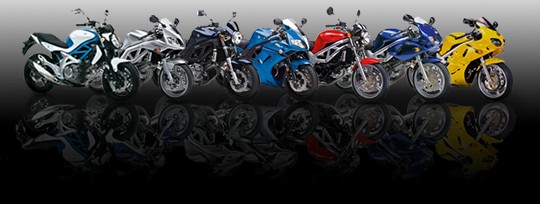 |
 |
| SV Talk, Tuning & Tweaking Discussion and chat on all topics and technical stuff related to the SV650 and SV1000 Need Help: Try Searching before posting |
 |
|
|
Thread Tools |
|
|
#1 |
|
Guest
Posts: n/a
|
Just a bit of info for anyone interested. I changed my engine oil to 15/50 w fully syn as my curvey has done 30k miles and I was shortly going to the South of France where it can be Very warm . After a couple of days my clutch started to muck about. I stripped it and found very little oil on the plates. After investigating the workshop manual I spotted a reference to "oil jets" in the lubrication system. I guessed that not enough oil was getting to where it needed to be due to the thicker oil, so I changed back to 10/40 semi-syn and the clutch is now perfect
|

|
|
|
#2 |
|
The Sick Man
Mega Poster
Join Date: Nov 2004
Location: Peckham.SE.LDN
Posts: 4,768
|
yep, fully synth is a waste on an SV, what the manuf recomends is usualy more than good
__________________
OTR: KTM 690 Duke R 2015 Full Akro SIDELINE: Kwak ZX636 A1P 2002, Red, R&G's, Yoshi, Double Bubble Screen GONE: Kwak ZX-7R P1, Full Akro, Undertray, Screen GONE: SV650S K2 Very Bruised & Without Fairing, Motovation Frame Sliders, R&G Ally Sprocket Toe Protector, HEL 2 Line Setup, GSXR K1 600 RWU Forks, Barnett Clutch & Springs, Penske 8981 Shock, Gilles Ti Rearsets, Steel Barends, Scottoiler, AFAM Chain & Sprockets, Twin FIAMM Horns, Skidmarx Bellypan, Full Micron Zeta Steel System, Cut down undertay. Forum Problems & Information / Site Suggestions |
|
|

|
|
|
#3 |
|
Member
Mega Poster
Join Date: May 2005
Location: Sunbury Middlesex
Posts: 1,396
|
Good morning.
The Nips have always recommended 10/40, as indeed a thicker oil will not flow fast enough down the narrow oil ways found in modern engines. Kawasaki caused confusion, as they used to recommend 10/40, 15/40, or 20/50, in their handbooks. But their main recommendation was for 10/40. Semi synthetic is fine, but at the risk of starting the 'great handbag flinging oil debate' of 2007 again, I always advise my customers to use fully synthetic. Cheers. |
|
|

|
|
|
#4 |
|
Member
Mega Poster
Join Date: Jul 2003
Location: In the shadows to the left
Posts: 7,700
|
|
|
|

|
|
|
#5 |
|
Member
Mega Poster
Join Date: May 2005
Location: Sunbury Middlesex
Posts: 1,396
|
Morning all.
This subject has been covered many times before, & usually starts a right good handbag flinging contest Suffice to say, that in my 30+ years of fiddling with engines of all kinds, I have found that providing it's of the correct grade & type, the better an oil is the longer the engine will last, be it in a bike, a car, a boat, a generator, or a triple expansion steam engine for that matter. There are many differing opinions on the subject, cost being one, but I speak as I find. Cheers. |
|
|

|
|
|
#6 |
|
Member
Mega Poster
Join Date: Jul 2003
Location: Warwickshire
Posts: 2,802
|
This is a very broad brush statement, and I don't intend to provoke a lot of response, but the general guide I'd recommend is to use as low a viscosity as you can get away with.
See what the ranges are that the manufacturer recommends in the handbook, and stick to the lower end unless you have really good reason not to. Half the job of oil is to cool, and as said in earlier posts, modern engines are designed to flow substantial volumes of oil around the place to this end. Big ends in particular need good flows, the oil film thickness and load bearing capacity is generated by the rotation not the supply pressure, as long as it has plenty of oil supplied to it. Plain bearings are designed to run satisfactorily on the lower end of the viscosity range, and high pressure contact regions like cams/followers and gear teeth take the oil into highly non-Newtonian behaviour as the apparent viscosity changes with extremely high pressure (thin films and high shear rates) found in these contacts, (potentially 100,000psi=600N/mm2 contact stress) and it's the additives (ZDDP etc) which do the scuffing protection here (cheapo oils tend to cut back on the additives). Synthetics have an advantage in the high local surface temperature areas like top rings etc, but most engines are designed to cope with semi-synth oil characteristics and limits anyway. Service interval is the other factor. Personally I use good quality semi-synth in my bikes and fully synth (Mobil1 bought in French supermarkets at half the cost here in the UK) in the car with a considerably longer service interval (10k miles/12 months). As an aside, hydraulic lash adjusters/tappets tend to work much better with lower viscosity oils, the filling is better so they are stiffer in use. If your engine has them then definitely don't use higher viscosity oil than recommended.
__________________
"Artificial Intelligence is no match for natural stupidity" |
|
|

|
|
|
#7 |
|
Guest
Posts: n/a
|
I only ever use or recommend 10W/40 Semi synth for the SV650. Like Silkolene Comp4 which is a higher grade Semi. Super4 though is more than adequate.
We only ever use this in our race engines, same with our powerbike engines even when tuned. Being sponsored by Silkolene and having long chats with the guy from Silkolene he also advised the same - semi synth 10w/40. |

|
 |
|
|
 Similar Threads
Similar Threads
|
||||
| Thread | Thread Starter | Forum | Replies | Last Post |
| front end up grade | Taylor1975 | SV Talk, Tuning & Tweaking | 10 | 25-03-08 07:18 PM |
| WHAT GRADE FORK OIL ??? | Stormspiel | SV Talk, Tuning & Tweaking | 2 | 19-07-05 06:29 PM |